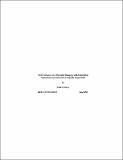| dc.contributor.author | Loury, Glenn C. | en_US |
| dc.date.accessioned | 2009-12-15T23:53:40Z | |
| dc.date.available | 2009-12-15T23:53:40Z | |
| dc.date.issued | 1990 | en_US |
| dc.identifier | 90-015 | en_US |
| dc.identifier.uri | http://hdl.handle.net/1721.1/50148 | |
| dc.description.abstract | This paper studies a dynamic, quantity setting duopoly game characterized as follows: Each firm produces an indivisible output over a potentially infinite horizon, facing the constraint that its cumulative production cannot exceed an initially given bound. The environment is otherwise stationary; the remaining productive capacities of the firms at any moment are common knowledge; the firms choose production plans contingent on these capacities which are mutual best responses in every contingency. The resulting Markov Perfect Equilibria are analyzed using a two-dimensional backward induction, and compared with the equilibria which emerge when precommitment to time paths of output is possible. It is shown that the ability to precommit can be disadvantageous; that collusion in Markov Equilibrium is facilitated by the symmetrical placement of the firms; and that having greater capacity confers basic strategic advantage on a firm by enabling it to credibly threaten future production. The model solves an open problem in the theory of exhaustible resource economics by imposing subgame perfection in a resource oligopoly with independent stocks. It also formalizes the intuition that, when indivisibilities are important, tacit coordination of plans so as to avoid destructive competition is facilitated by establishing a convention of "taking turns" - that is, a self-enforcing norm of mutual, alternate forbearance. | en_US |
| dc.description.sponsorship | Supported by the Bradley Foundation, the Olin Foundation and the Center for Energy Policy Research, MIT. | en_US |
| dc.format.extent | 43 p | en_US |
| dc.publisher | MIT Center for Energy and Environmental Policy Research | en_US |
| dc.relation.ispartofseries | Working paper (Massachusetts Institute of Technology. Center for Energy Policy Research) ; MIT-CEPR 90-015. | en_US |
| dc.title | Tacit collusion in a dynamic duopoly with indivisible production and cumulative capacity constraints | en_US |
| dc.type | Working Paper | en_US |
| dc.identifier.oclc | 28596090 | en_US |
